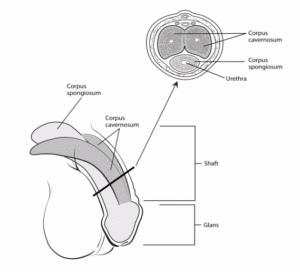 Overview
Overview
The penis is the external male genital organ. Inside the penis is the urethra, the tube through which urine and semen exit the body. The head of the penis is called the gland.
Inside the penis are 3 chambers that contain a soft, spongy network of blood vessels. Two of these cylinders shaped chambers known as the corpora cavernosa, lie on either side of the upper part of the penis. The third lies below them and is known as the corpus spongiosum. This chamber widens at its end to form the gland. The corpus spongiosum surrounds the urethra, a tube that caries urine from the bladder through the penis. This opening at the end of the urethra is called the meatus.
Type of cancers of the penis
Epidermoid carcinoma – 90 to 95% of penile cancers develop from flat skin cells called squamous cells. Penile tumors tend to grow slowly. When found at an early stage, these tumors can be cured. Most Squamous cell penile cancers develop in the penis foreskin, or glans penis.
Verrucous carcinoma – It is a rarely occurring form of squamous cell cancer that can occur on the male or female genitals, skin, mouth, larynx and anus.
Adenocarcinoma – Is a rare type of penile cancer, can develop from sweat glands in the skin of the penis. The cancer cells at first spread within the skin, but they may eventually, invade underneath the skin and spread to lymph nodes.
Melanoma – A small percentage of penile cancers develop from pigment producing skin cells called melanocytes. Cancers of these cells are called melanomas. These cancers grow and spread rapidly.
Basal cell penile cancers – Basal cell cancers represent less than 2% of penile cancers. They are slowly growing tumors that rarely spread to other parts of the body.
Sarcomas – A small percentage of penile cancers are sarcomas, cancers that develop from the blood vessels, smooth muscles, and other connective tissue cells of the penis.
Risk factors
Human papiloma virus infection – It is the most avoidable risk factor for penile cancer.
Smoking and alcohol – Tobacco use and alcohol usage greatly increases the risk of developing penile cancer.
Smegma –Oily secretions from the skin, dead skin cells and bacteria can accumulate under the foreskin. The result is a thick, substance called Smegma. The resulting inflammation and irritation can cause cancer.
Treatment of psoriasis – Men who have psoriasis and have been treated with a combination of psoralean and ultraviolet light have a high risk of developing penile cancer.
Age – Majority of penile cancer cases are above 55-60 years of age.
Signs and Symptoms
A growth or ulcer on the penis, especially on the glans or foreskin.
Changes in color on the penis.
Skin thickening on the penis.
Persistent discharge with foul odor beneath the foreskin.
Blood coming from the tip of the penis or under the skin.
Unexplained pain in the penis.
Growing marks or lesions beneath the foreskin or on the body of the penis.
Reddish rashes beneath the foreskin.
Swollen groin lymph nodes.
Irregular swelling at the end of the penis.
Diagnosis as per modern science
Biopsy
- Fine needle aspiration
- Sentinel node biopsy
CT scan
MRI
Ultrasound
X-Rays
Staging
Stage I – Cancer cells are found only on the surface of the glans (the head of the penis) and on the foreskin (the loose skin that covers the head of the penis).
Stage II – Cancer cells are found in the deeper tissues of the glands and have spread to the shaft of the penis (the long, slender cylinders of tissue inside the penis that contains spongy tissue and expands to produce erections.
Stage III – Cancer cells are found in the penis and have spread to nearby lymph nodes in the groin.
Stage IV – Cancer cells are found throughout the penis and the lymph nodes in the groin and/or have spread to other parts of the body.

 Overview
Overview